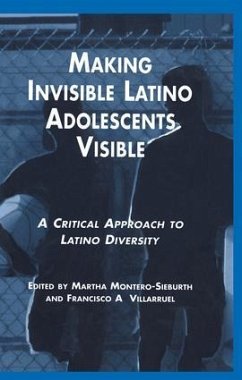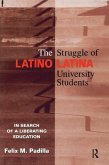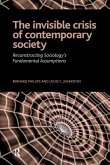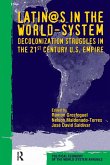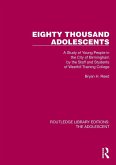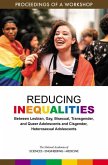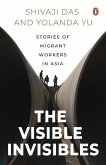Martha Montero-Sieburth, Francisco VillaruelA Critical Approach to Latino Diversity
Making Invisible Latino Adolescents Visible
A Critical Approach to Latino Diversity
Herausgeber: Michigan State University Staff
Martha Montero-Sieburth, Francisco VillaruelA Critical Approach to Latino Diversity
Making Invisible Latino Adolescents Visible
A Critical Approach to Latino Diversity
Herausgeber: Michigan State University Staff
- Broschiertes Buch
- Merkliste
- Auf die Merkliste
- Bewerten Bewerten
- Teilen
- Produkt teilen
- Produkterinnerung
- Produkterinnerung
Making Invisible Latino Adolescents Visible explores both economic and social factors that hinder the progress of Latino youth in the United States.
Andere Kunden interessierten sich auch für
![The Struggle of Latino/Latina University Students The Struggle of Latino/Latina University Students]() Felix M. PadillaThe Struggle of Latino/Latina University Students30,99 €
Felix M. PadillaThe Struggle of Latino/Latina University Students30,99 €![Invisible Crisis of Contemporary Society Invisible Crisis of Contemporary Society]() Bernard S PhillipsInvisible Crisis of Contemporary Society45,99 €
Bernard S PhillipsInvisible Crisis of Contemporary Society45,99 €![Latino/as in the World-system Latino/as in the World-system]() Ramon GrosfoguelLatino/as in the World-system98,99 €
Ramon GrosfoguelLatino/as in the World-system98,99 €![Eighty Thousand Adolescents Eighty Thousand Adolescents]() Bryan H. ReedEighty Thousand Adolescents44,99 €
Bryan H. ReedEighty Thousand Adolescents44,99 €![Adolescents at Risk Adolescents at Risk]() Joy G. DryfoosAdolescents at Risk99,99 €
Joy G. DryfoosAdolescents at Risk99,99 €![Reducing Inequalities Between Lesbian, Gay, Bisexual, Transgender, and Queer Adolescents and Cisgender, Heterosexual Adolescents Reducing Inequalities Between Lesbian, Gay, Bisexual, Transgender, and Queer Adolescents and Cisgender, Heterosexual Adolescents]() National Academies of Sciences Engineering and MedicineReducing Inequalities Between Lesbian, Gay, Bisexual, Transgender, and Queer Adolescents and Cisgender, Heterosexual Adolescents24,99 €
National Academies of Sciences Engineering and MedicineReducing Inequalities Between Lesbian, Gay, Bisexual, Transgender, and Queer Adolescents and Cisgender, Heterosexual Adolescents24,99 €![The Visible Invisibles The Visible Invisibles]() Shivaji DasThe Visible Invisibles17,99 €
Shivaji DasThe Visible Invisibles17,99 €-
-
-
Making Invisible Latino Adolescents Visible explores both economic and social factors that hinder the progress of Latino youth in the United States.
Produktdetails
- Produktdetails
- Verlag: Routledge
- Seitenzahl: 388
- Erscheinungstermin: 7. Mai 2015
- Englisch
- Abmessung: 216mm x 140mm x 21mm
- Gewicht: 487g
- ISBN-13: 9781138880313
- ISBN-10: 1138880310
- Artikelnr.: 42797234
- Herstellerkennzeichnung
- Libri GmbH
- Europaallee 1
- 36244 Bad Hersfeld
- gpsr@libri.de
- Verlag: Routledge
- Seitenzahl: 388
- Erscheinungstermin: 7. Mai 2015
- Englisch
- Abmessung: 216mm x 140mm x 21mm
- Gewicht: 487g
- ISBN-13: 9781138880313
- ISBN-10: 1138880310
- Artikelnr.: 42797234
- Herstellerkennzeichnung
- Libri GmbH
- Europaallee 1
- 36244 Bad Hersfeld
- gpsr@libri.de
Martha Montero-Sieburth, Francisco Villaruel, Michigan State University Staff
Dr. Anna Santiago of Indiana University on the demographic growth of Latino
youth with emphases including income, family astatus and family employment
* Dr. Cynthia Garcia Coll of Wellesley College on intre-group differences
among Puerto Rican females * Dr. Antonio Villaruel of University of
Michigan on the health and well-being of adolescents * Dr. Richard Santos
of University of New Mexico on the economic conditions that affect Latino
youth, with an analysis of their labor market participation * Dr. Martha
Montero Sieburth of Harvard Medical School on the language, public and
private spac, and schooling of Latino adolescents * Dr. Henry Trueba of
University of Wisconsin on the conditions of at-risk and dropping out with
approaches to strengthening adolescents * Dr. Raimundo Mora of Rutgers
University on the significance of literacy and empowerment concerns in the
lives of Latinos in secondary and post-secondary opportunities * Dr.
Ricardo Stanton Salazar of Unievrsity of California at San Diego on the
micro-processes that affect access to institutional agents. * Dr. Olga
Vaquez of the University of California at San Diego on the development of
bilingual and bicultural community ties based on after-school programs to
facilitate in-school learning * Dr. Loiuse Moll of University of Arizona on
the unique aspects and strengths of Latino communities and how schools can
build upon this capacity to promote academic achievement of Latino
adolescents. Index.
youth with emphases including income, family astatus and family employment
* Dr. Cynthia Garcia Coll of Wellesley College on intre-group differences
among Puerto Rican females * Dr. Antonio Villaruel of University of
Michigan on the health and well-being of adolescents * Dr. Richard Santos
of University of New Mexico on the economic conditions that affect Latino
youth, with an analysis of their labor market participation * Dr. Martha
Montero Sieburth of Harvard Medical School on the language, public and
private spac, and schooling of Latino adolescents * Dr. Henry Trueba of
University of Wisconsin on the conditions of at-risk and dropping out with
approaches to strengthening adolescents * Dr. Raimundo Mora of Rutgers
University on the significance of literacy and empowerment concerns in the
lives of Latinos in secondary and post-secondary opportunities * Dr.
Ricardo Stanton Salazar of Unievrsity of California at San Diego on the
micro-processes that affect access to institutional agents. * Dr. Olga
Vaquez of the University of California at San Diego on the development of
bilingual and bicultural community ties based on after-school programs to
facilitate in-school learning * Dr. Loiuse Moll of University of Arizona on
the unique aspects and strengths of Latino communities and how schools can
build upon this capacity to promote academic achievement of Latino
adolescents. Index.
Dr. Anna Santiago of Indiana University on the demographic growth of Latino
youth with emphases including income, family astatus and family employment
* Dr. Cynthia Garcia Coll of Wellesley College on intre-group differences
among Puerto Rican females * Dr. Antonio Villaruel of University of
Michigan on the health and well-being of adolescents * Dr. Richard Santos
of University of New Mexico on the economic conditions that affect Latino
youth, with an analysis of their labor market participation * Dr. Martha
Montero Sieburth of Harvard Medical School on the language, public and
private spac, and schooling of Latino adolescents * Dr. Henry Trueba of
University of Wisconsin on the conditions of at-risk and dropping out with
approaches to strengthening adolescents * Dr. Raimundo Mora of Rutgers
University on the significance of literacy and empowerment concerns in the
lives of Latinos in secondary and post-secondary opportunities * Dr.
Ricardo Stanton Salazar of Unievrsity of California at San Diego on the
micro-processes that affect access to institutional agents. * Dr. Olga
Vaquez of the University of California at San Diego on the development of
bilingual and bicultural community ties based on after-school programs to
facilitate in-school learning * Dr. Loiuse Moll of University of Arizona on
the unique aspects and strengths of Latino communities and how schools can
build upon this capacity to promote academic achievement of Latino
adolescents. Index.
youth with emphases including income, family astatus and family employment
* Dr. Cynthia Garcia Coll of Wellesley College on intre-group differences
among Puerto Rican females * Dr. Antonio Villaruel of University of
Michigan on the health and well-being of adolescents * Dr. Richard Santos
of University of New Mexico on the economic conditions that affect Latino
youth, with an analysis of their labor market participation * Dr. Martha
Montero Sieburth of Harvard Medical School on the language, public and
private spac, and schooling of Latino adolescents * Dr. Henry Trueba of
University of Wisconsin on the conditions of at-risk and dropping out with
approaches to strengthening adolescents * Dr. Raimundo Mora of Rutgers
University on the significance of literacy and empowerment concerns in the
lives of Latinos in secondary and post-secondary opportunities * Dr.
Ricardo Stanton Salazar of Unievrsity of California at San Diego on the
micro-processes that affect access to institutional agents. * Dr. Olga
Vaquez of the University of California at San Diego on the development of
bilingual and bicultural community ties based on after-school programs to
facilitate in-school learning * Dr. Loiuse Moll of University of Arizona on
the unique aspects and strengths of Latino communities and how schools can
build upon this capacity to promote academic achievement of Latino
adolescents. Index.

